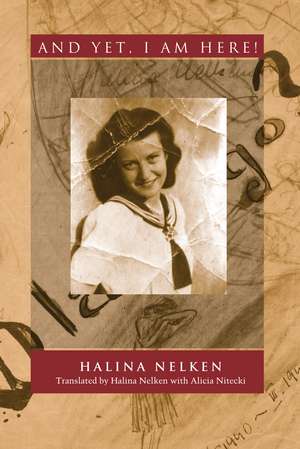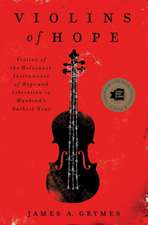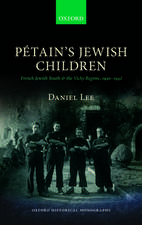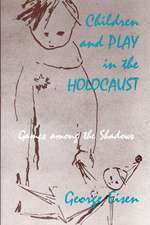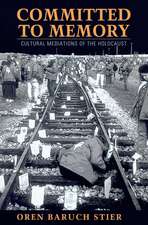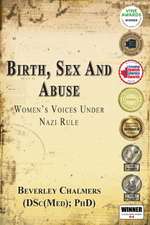And Yet, I Am Here!
Autor Halina Nelken Introducere de Gideon Hausneren Limba Engleză Paperback – 9 apr 2001
When Germany invaded Poland in 1939, Halina Nelken was a precocious fifteen-year-old, living a middle-class life in Krakow. Like other girls her age, she recorded her personal observations and feelings in a diary. As conditions in Krakow deteriorated and her family was forced into the Jewish ghetto, she continued to write, eventually smuggling her diary out with a Catholic friend. This remarkable book tells the story of Nelken's experiences in the ghetto and later in eight Nazi concentration camps, including Plaszow, Auschwitz, and Ravensbröck. Her diary entries, written between 1938 and 1943, form the core of the volume and are supplemented by recollections written shortly after the war, and by later commentaries and explanatory notes which she added in the mid-1980s. Although there exist numerous published and unpublished memoirs by Holocaust survivors, Nelken's book presents one of the few extant diaries written at the time. Already released in Polish and German editions, it has been hailed as one of the finest works of its kind. Now it is available in English for the first time.
Preț: 262.40 lei
Nou
Puncte Express: 394
Preț estimativ în valută:
50.23€ • 54.58$ • 42.22£
50.23€ • 54.58$ • 42.22£
Carte tipărită la comandă
Livrare economică 21 aprilie-05 mai
Preluare comenzi: 021 569.72.76
Specificații
ISBN-13: 9781558492929
ISBN-10: 1558492925
Pagini: 304
Dimensiuni: 157 x 235 x 20 mm
Greutate: 0.45 kg
Ediția:First Edition
Editura: University of Massachusetts Press
Colecția University of Massachusetts Press
ISBN-10: 1558492925
Pagini: 304
Dimensiuni: 157 x 235 x 20 mm
Greutate: 0.45 kg
Ediția:First Edition
Editura: University of Massachusetts Press
Colecția University of Massachusetts Press
Notă biografică
After World War II, Halina Nelken pursued a career as an art historian, moving to the United States in 1959. She now lives in Cambridge, Massachusetts.
Recenzii
"While memoirs of the war years abound, diaries kept at the time are rare. Still rarer are diaries as moving, intelligent, and well-written as this one. The work of an independent, highly observant, and talented girl, it invites comparison to The Diary of Anne Frank and does not lose in the comparison. . . . Nelken's book is a brilliant and engrossing portrayal of the coming of age of a Polish Jewish girl during the Second World War, as well as an authentic, eyewitness account of life in all its moral complexity in German-held Krakow and the concentrations camps."—Alicia Nitecki, author of Recovered Land
"A priceless document of rare value and importance, which allows the reader and the historian of the period to comprehend more clearly the psychological plight of the people locked in the ghetto, through the personal experience and thorough self-analysis of a young girl."—Gideon Hausner, chief prosecutor,
Eichman trial, and author of Justice in Jerusalem
"Nelken's diary is one of the most important to survive from the Second World War. Written by a young girl from a protected and privileged background, it gives a unique and moving account of the Nazi occupation and of the experience of the camps of Plaszow and Auschwitz. . . . There are many memoirs and diaries of the Holocaust, but few with such immediacy and with such a genuine voice."—Antony Polonsky, Brandeis University
"As a teenager, Nelken, who is Jewish, kept a diary of the permanent destruction of her comfortable life when the Nazis overran her homeland. Unlike Anne Frank, this girl survived the Holocaust to tell the full story. Now an art historian, she was born to a prosperous, assimilated Polish family. And she recalls, with bittersweet verisimilitude, her idyllic early days in Krakowthe people and the pastry, the kitchens and the streets. Moved from home to the ghetto and to ever more confined quarters and constricted living conditions, Nelken goes on to describe the travails of her parents and brother, her friends at gimnazium (when she was allowed to attend school), her work (including enforced street cleaning), and, with special grace, her youthful yearnings and romances. Despite lack of rest and food, she notes the music, poetry, and aspirations she found in the ghetto. ``Somehow,'' she wrote in her diary, ``I hope that something will happen and my life will change for the better.'' Then the ghetto was closed, and Nelken, her mother, and sister-in-law were sent to the Plaszow, Auschwitz, and Ravensbrck concentration camps, where the likes of Amon Gth, Franz Hoessler, and Dr. Mengele were her keepers. By the closing days of the war, some prisoners were able to escape and, save for her father, the author and her immediate family endured. Her story of purgatory is a lifetime ago and a world away from her present life in academic Cambridge, Mass. But she fulfills a moral obligation to remember the past, while urging us not to heed the ``professional Holocaustniks'' who weren't even there. ``If only,'' she wishes for those who were, I could protect all of us from forgetfulness, individually, as we were, we living people!'' In moving testimony, her legacy is another story snatched from six million. An intelligent and writerly memoir."—Kirkus Reviews
"A priceless document of rare value and importance, which allows the reader and the historian of the period to comprehend more clearly the psychological plight of the people locked in the ghetto, through the personal experience and thorough self-analysis of a young girl."—Gideon Hausner, chief prosecutor,
Eichman trial, and author of Justice in Jerusalem
"Nelken's diary is one of the most important to survive from the Second World War. Written by a young girl from a protected and privileged background, it gives a unique and moving account of the Nazi occupation and of the experience of the camps of Plaszow and Auschwitz. . . . There are many memoirs and diaries of the Holocaust, but few with such immediacy and with such a genuine voice."—Antony Polonsky, Brandeis University
"As a teenager, Nelken, who is Jewish, kept a diary of the permanent destruction of her comfortable life when the Nazis overran her homeland. Unlike Anne Frank, this girl survived the Holocaust to tell the full story. Now an art historian, she was born to a prosperous, assimilated Polish family. And she recalls, with bittersweet verisimilitude, her idyllic early days in Krakowthe people and the pastry, the kitchens and the streets. Moved from home to the ghetto and to ever more confined quarters and constricted living conditions, Nelken goes on to describe the travails of her parents and brother, her friends at gimnazium (when she was allowed to attend school), her work (including enforced street cleaning), and, with special grace, her youthful yearnings and romances. Despite lack of rest and food, she notes the music, poetry, and aspirations she found in the ghetto. ``Somehow,'' she wrote in her diary, ``I hope that something will happen and my life will change for the better.'' Then the ghetto was closed, and Nelken, her mother, and sister-in-law were sent to the Plaszow, Auschwitz, and Ravensbrck concentration camps, where the likes of Amon Gth, Franz Hoessler, and Dr. Mengele were her keepers. By the closing days of the war, some prisoners were able to escape and, save for her father, the author and her immediate family endured. Her story of purgatory is a lifetime ago and a world away from her present life in academic Cambridge, Mass. But she fulfills a moral obligation to remember the past, while urging us not to heed the ``professional Holocaustniks'' who weren't even there. ``If only,'' she wishes for those who were, I could protect all of us from forgetfulness, individually, as we were, we living people!'' In moving testimony, her legacy is another story snatched from six million. An intelligent and writerly memoir."—Kirkus Reviews
